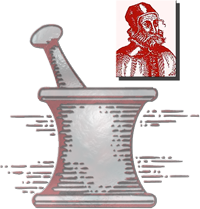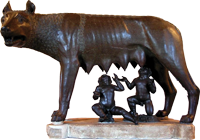
The Roman Empire
500 B.C. THE ROMAN EMPIRE
ROMULUS AND REMUS, SONS OF THE OLIVE TREE
The power exerted by the olive tree was so great that the statues of the gods, scepters and weapons of combat were made with its wood. It was believed that the children of the gods were born in the shade of an olive tree. This belief led very many pregnant women to give birth under an olive tree. Moreover, legend has it that Romulus and Remus, founders of Rome, were born under an olive tree.Penetrello, historian and Roman analyst, defended the thesis that the first olive tree in Italy sprouted during the kingdom of Lucius Tarquinius Priscus, the Elder (616 - 578 B.C.), possibly having been brought from Tripoli or Gaes in Tunisia. From then on, the Romans began to disseminate and encourage the growing of olive trees in the countries they had conquered. Even if this were not true, it happens that, even in the countries where there already were olive trees, the influence of Rome was the springboard that gave impulse and importance to the development of this cultivation.
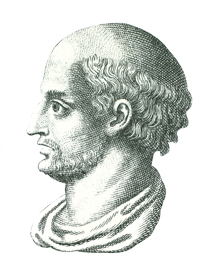
OLIVE OIL AS INVESTMENT
In periods of ancient history, the production technique and possession of a certain food performed the role that today major discoveries and technological domains exercise for royalty holders. Possessing the technique to produce bread, wine and olive oil, in detriment to the simple obtaining of meat and milk, was a strong sign of civilization and distinction among men (capable of creating and producing their own food), and the animals or barbaric peoples (living only by hunting and gathering).In the II century B.C., Cato, the Elder, owner of several rural properties - in a treatise on agriculture (De Agricultura e De Re Rustica), teaches how to establish a large farm for the mixed cultivation of timber trees, cereals, and fruits, including grapes and olives. In North Africa, in the same region where vestiges were found of the olive tree 14 thousand years ago, the Romans encouraged the cultivation of olive trees and production of the oil. From the then Mauretania Tingitana to Morocco, passing through Auritana Cesarea and Numidia (in the present Morocco, Algeria and Tunisia), cities like Volubilis, Banasa, Cartenae, Sifitis, Lambaese, Thamugadi, Thevesa and Capsa, centralized the trade with incentives from Rome. In these regions, ruins of dozens of presses and storehouses from that time have been found, revealing that there was great olive oil production, which made North Africa one of the most important domains of the Roman Empire.
Till this day, Morocco and Tunisia continue to be major producers. Sophocles (497 - 405 B.C.), great Greek poet and playwright, author of obras primas, such as Antigone, Electra and King Oedipus, among others, described the olive as the sweet grey nursemaid. Syria, a great cereal producer, exported grain to various Greek cities/states and received large quantities of wine and olive oil in amphoras and ceramic vessels, by camel, caravan and ship.

EATING OLIVE OIL
In ancient classical, the commonest foods were game, birds, some kind of wheat mixture or, representing bread, some other cereal (spelled wheat mace and puls), cakes cooked in bonfires or in the ashes of wheat, barley, spelled or millet-based ovens, soups and creams. Besides this, there were also legumes such as beans, chickpeas, lentils, peas, garlic, leek, onion and cabbage.However, the Greco-Roman civilization had its peculiarities. The food was based on the three staples: wheat, wine and olives. This reference however, is in fact theoretical, and seeks to create an aura of superiority for these peoples, perpetuating the concept that they were always seeking simple, healthy food, a fact reflected in the Greek and Italian gastronomic knowledge of today.
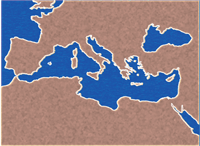
HISPANIA ENTERS THE SCENE
Hispania was one of the most important conquests of Rome, with Augustus, as one of its most prominent administrators, who eventually became Cesar. From the ports of Bética, in Hispania, so many ships must have set sail laden with olive oil that, in 1878, the archaeologist, T. Frank found a small mountain of broken pottery, presumably formed between 138 and 260 B.C., 35m high with a perimeter of 1.6km, next to the port of Óstia, the coastal town nearest Rome.The tons of fragments represent approximately 40 million amphoras, 2 billion litres of olive oil destined for Rome and many other cities under its control. As, in Italian, the word testum means shards/gravel, after discovering the aforementioned mound, it became known as Monte Testaccio. In the IV century B.C., Solon, known as one of the Seven Wisemen of Greece, created regulations that sought to encourage the cultivation of olive trees.
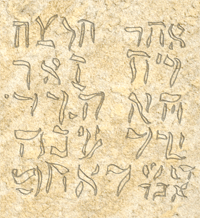
THE BIBLICAL RECORDS
Then Moses said to the people of Israel: And because you have heard these decrees and have kept and carried out them, Jehovah your God will keep with you the covenant and the mercy that he swore to your fathers. And he will love you, he will bless you and multiply you, and he will bless the fruit of your womb and the fruit of your land, your grain, your new wine, your oil, the young of your cows, and the flocks of your sheep, in the land that he swore to your parents he would give you. (Deuteronomy 7,11 / 13) Because the Lord is going to take you to a good land, to a country full of streams, fountains and springs that spring up in the valleys and on the mountains; it is a land where there is wheat, barley, vineyards, fig trees, pomegranates, olive trees and honey.In that country you will not have to worry about lack of food, or anything else. (Deuteronomy 8.7 / 9) When they approached Jerusalem and arrived at Bethphage, on the Mount of Olives, Jesus sent two disciples ... (Matthew 21: 1) Then Jesus came with them to a place called Gethsemane (oil mill), and said to his disciples: Sit here, meanwhile, I go there and pray. (Matthew 26:36)
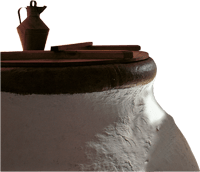
A COMPLETE PACKAGE
The amphoras for the transport of olive oil constituted a precious trade document, given that on them were noted the name of the merchant, the transporter, the gross and net weights, and the date of the transaction, besides acting as a system of fiscal control.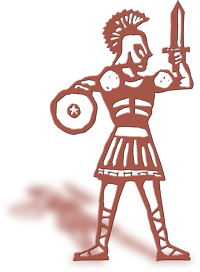
PUBLIC INVESTMENT
In order to keep its empire supplied with olive oil, Rome offered two basic benefits to those who planted olive trees: financial support until the trees started to bear fruit, and a guarantee of peace. Around the I century B.C., the Roman Empire extended eastward from Spain to Syria and northward to Britain, southward to the Sahara. The citizens of these ancient republics were originally small farmers, producing for family consumption and exchanging the surplus. Throughout the decades, even centuries, of occupation, the lands were expropriated by Rome and grabbed by enterprising aristocrats who pieced together small properties to form large ones, using slave labour from the colonies.Over time, these landlords transformed the subsistence plots into rich wine and olive producing concerns geared to the export market. For the more needy inhabitants, the public administration in Rome made regular distributions of free food, including patties of cereals and olive oil. Joining together food and the fights between gladiators, and between gladiators and wild animals, constituted the famous Roman panis et circenses.
Lucius Iunis Moderatus Columella, native of Cadiz, born in the I century after Christ, in his book Sobre a Agricultura, said that the olive trees planted on slopes in Italy and Bética are those that provide the best oils. In order to have a more accurate idea of the importance of olive oil in Roman culture, suffice to remember that, around the year 212, when Sétimo Severo died, olive oil, having come primarily from Bética and North Africa, was stored in Rome, where stocks could supply the city for up to 5 years. And here lies an important fact: the amphoras used in antiquity, made from clay and perfectly sealed, provided perfect protection from the air, blocked light from entering, and maintained low temperatures. Thus, the olive oil had the conditions necessary for keeping its original properties.
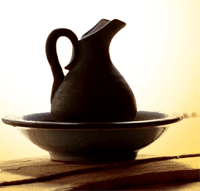
BLESSING THE PREDESTINED
Then Samuel said to Jesse: Are these all your sons? And he answered: There is still the youngest, who is feeding the sheep. And Samuel said to Jesse: Send for him, because we will not sit at table until he comes here. So he sent for him, and brought him in; and he was blond, beautiful-eyed, and good-looking. Then the Lord said: Arise and anoint him, for this is he. And Samuel took the horn of oil, and anointed him in the midst of his brothers; and from that day forward the Spirit of the Lord came upon David. Then Samuel got up and turned to Ramah. (I Samuel 16.11 / 13)And the priest Zadok, Nathan the prophet, Benaiah son of Joyadá, and the Cretans and Peleteos descended, they went for King David's mule for Solomon to mount, and then they left for Guijon. (Kings 1.38 / 40)
And the priest Zadok took the horn of oil from the tabernacle, and anointed Solomon; And they blew the trumpet, and all the people said, Long live King Solomon! (I Kings 1,38 / 39)
Solomon, David and all the glory and greatness of the Kings of Israel asked for fruitfulness by being anointed with olive oil. And in all their wisdom, they looked to the anointing for the obedience, admiration and bravery of their subjects. When he entered the city gate, a widowed woman was there gathering firewood. He called her Elías and said: "Please bring me some water for me in your jug so that I can drink." When she was going to bring it to him, he shouted: "Please bring me a bite of bread in your hand." She said: «Yahveh your God lives, I have no baked bread: I only have a handful of flour in the jar and a little oil in the centerboard. I'm picking up two sticks, I'll come in and prepare it for myself and my son, we'll eat it and die. " But Elijah said to him, “Don't be afraid. Come in and do as you said, but first make a small cake for me and bring it to me, and then you will make it for yourself and your child. For thus says Yahveh, God of Israel: The flour in the jar will not run out, the oil will not run out in the centerboard until the day when Yahveh grants rain on the face of the earth. She went and did according to Elijah's word, and she, he, and her son ate. The flour in the jar did not run out, nor did the oil run out in the centerboard, according to the word that Yahveh had spoken through the mouth of Elijah. (1 Kings 17.10 / 16)
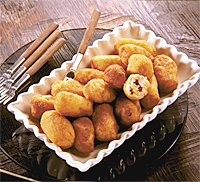
AN ANCIENT RECIPE
Apicius en su De Re Coquinaria, presents us with the recipe shown below:
Spicy Fried PumpkinsGrind pepper, cumin, oregano, onion, and add# wine, garum(a sauce made from fish entrails, very common at the time), and olive oil.
Finally, fry slices of pumpkin with starch in a frying pan.
We presume that the pumpkin is to be basted with this paste and starch, and then fried.
